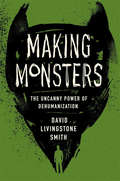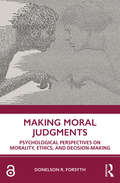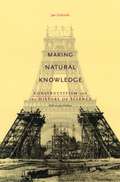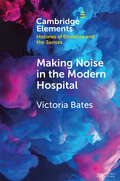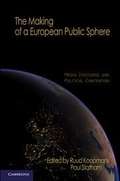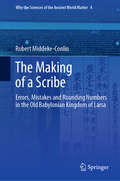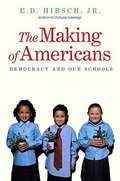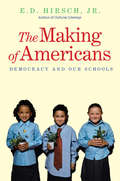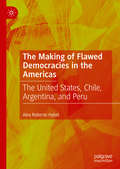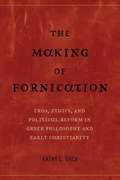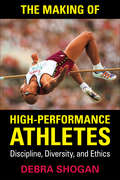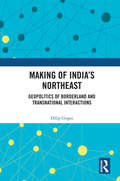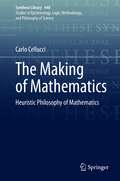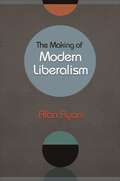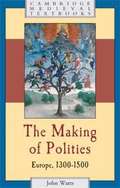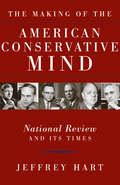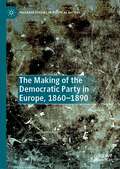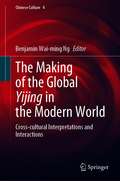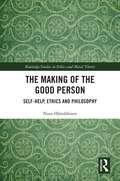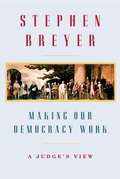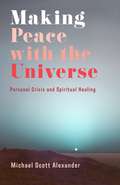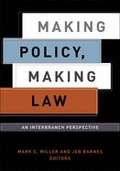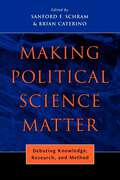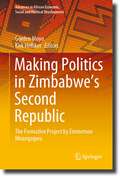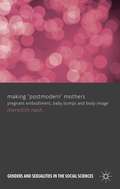- Table View
- List View
Making Monsters: The Uncanny Power of Dehumanization
by David Livingstone SmithA leading scholar explores what it means to dehumanize others—and how and why we do it. “I wouldn’t have accepted that they were human beings. You would see an infant who’s just learning to smile, and it smiles at you, but you still kill it.” So a Hutu man explained to an incredulous researcher, when asked to recall how he felt slaughtering Tutsis in Rwanda in 1994. Such statements are shocking, yet we recognize them; we hear their echoes in accounts of genocides, massacres, and pogroms throughout history. How do some people come to believe that their enemies are monsters, and therefore easy to kill? In Making Monsters David Livingstone Smith offers a poignant meditation on the philosophical and psychological roots of dehumanization. Drawing on harrowing accounts of lynchings, Smith establishes what dehumanization is and what it isn’t. When we dehumanize our enemy, we hold two incongruous beliefs at the same time: we believe our enemy is at once subhuman and fully human. To call someone a monster, then, is not merely a resort to metaphor—dehumanization really does happen in our minds. Turning to an abundance of historical examples, Smith explores the relationship between dehumanization and racism, the psychology of hierarchy, what it means to regard others as human beings, and why dehumanizing others transforms them into something so terrifying that they must be destroyed. Meticulous but highly readable, Making Monsters suggests that the process of dehumanization is deeply seated in our psychology. It is precisely because we are all human that we are vulnerable to the manipulations of those trading in the politics of demonization and violence.
Making Moral Judgments: Psychological Perspectives on Morality, Ethics, and Decision-Making
by Donelson ForsythThis fascinating new book examines diversity in moral judgements, drawing on recent work in social, personality, and evolutionary psychology, reviewing the factors that influence the moral judgments people make. Why do reasonable people so often disagree when drawing distinctions between what is morally right and wrong? Even when individuals agree in their moral pronouncements, they may employ different standards, different comparative processes, or entirely disparate criteria in their judgments. Examining the sources of this variety, the author expertly explores morality using ethics position theory, alongside other theoretical perspectives in moral psychology, and shows how it can relate to contemporary social issues from abortion to premarital sex to human rights. Also featuring a chapter on applied contexts, using the theory of ethics positions to gain insights into the moral choices and actions of individuals, groups, and organizations in educational, research, political, medical, and business settings, the book offers answers that apply across individuals, communities, and cultures. Investigating the relationship between people’s personal moral philosophies and their ethical thoughts, emotions, and actions, this is fascinating reading for students and academics from psychology and philosophy and anyone interested in morality and ethics.
Making Natural Knowledge: Constructivism and the History of Science
by Jan GolinskiArguably the best available introduction to constructivism, a research paradigm that has dominated the history of science for the past forty years, Making Natural Knowledge reflects on the importance of this theory, tells the history of its rise to prominence, and traces its most important tensions. Viewing scientific knowledge as a product of human culture, Jan Golinski challenges the traditional trajectory of the history of science as steady and autonomous progress. In exploring topics such as the social identity of the scientist, the significance of places where science is practiced, and the roles played by language, instruments, and images, Making Natural Knowledge sheds new light on the relations between science and other cultural domains. "A standard introduction to historically minded scholars interested in the constructivist programme. In fact, it has been called the 'constructivist's bible' in many a conference corridor. "-Matthew Eddy, British Journal for the History of Science
Making Noise in the Modern Hospital (Elements in Histories of Emotions and the Senses)
by Victoria BatesThis Element examines the problem of hospital noise, a problem that has repeatedly been discovered anew, with each new era bringing its own efforts to control and abate unwanted sound in healthcare settings. Why, then, has hospital noise never been resolved? This question is at the heart of Making Noise in the Modern Hospital, which brings together histories of the senses, space, technology, society, medicine and architecture to understand the changing cacophony of the late twentieth-century hospital. This Element is fundamentally interdisciplinary – despite being historical, it comes up to the present day and brings in scholarship on space, place, atmosphere and the senses that will have relevance to scholars working outside of historical research. The intersection between medical and sensory histories also puts interdisciplinary research at the Element's core.
The Making of a European Public Sphere
by Ruud Koopmans Paul StathamThis book investigates an important source of the European Union's recent legitimacy problems. It shows how European integration is debated in mass media, and how this affects democratic inclusiveness. Advancing integration implies a shift in power between governments, parliaments, and civil society. Behind debates over Europe's "democratic deficit" is a deeper concern: whether democratic politics can perform effectively under conditions of Europeanization and globalization. This study is based on a wealth of unique data from seven European countries, combining newspaper content analyses, an innovative study of Internet communication structures, and hundreds of interviews with leading political and media representatives across Europe. It is by far the most far-reaching and empirically grounded study on the Europeanization of media discourse and political contention to date, and a must-read for anyone interested in how European integration changes democratic politics and why European integration has become increasingly contested.
The Making of a Scribe: Errors, Mistakes and Rounding Numbers in the Old Babylonian Kingdom of Larsa (Why the Sciences of the Ancient World Matter #4)
by Robert Middeke-ConlinThis book presents a novel methodology to study economic texts. The author investigates discrepancies in these writings by focusing on errors, mistakes, and rounding numbers. In particular, he looks at the acquisition, use, and development of practical mathematics in an ancient society: The Old Babylonian kingdom of Larsa (beginning of the second millennium BCE Southern Iraq). In so doing, coverage bridges a gap between the sciences and humanities. Through this work, the reader will gain insight into discrepancies encountered in economic texts in general and rounding numbers in particular. They will learn a new framework to explain error as a form of economic practice. Researchers and students will also become aware of the numerical and metrological basis for calculation in these writings and how the scribes themselves conceptualized value. This work fills a void in Assyriological studies. It provides a methodology to explore, understand, and exploit statistical data. The anlaysis also fills a void in the history of mathematics by presenting historians of mathematics a method to study practical texts. In addition, the author shows the importance mathematics has as a tool for ancient practitioners to cope with complex economic processes. This serves as a useful case study for modern policy makers into the importance of education in any economy.
The Making of Americans: Democracy and Our Schools
by E. D. Hirsch Jr.This comprehensive and thought-provoking book offers a masterful analysis of how American ideas about education have veered off course, what must be done to right them, and most importantly why.
The Making of Americans: Democracy and Our Schools
by E. D. Hirsch Jr.From the bestselling author of Cultural Literacy, a passionate and cogent argument for reforming the way we teach our children.Why, after decades of commissions, reforms, and efforts at innovation, do our schools continue to disappoint us? In this comprehensive book, educational theorist E. D. Hirsch, Jr. masterfully analyzes how American ideas about education have veered off course, what we must do to right them, and most importantly why. He argues that the core problem with American education is that educational theorists, especially in the early grades, have for the past sixty years rejected academic content in favor of &“child-centered&” and &“how-to&” learning theories that are at odds with how children really learn. The result is failing schools and widening inequality, as only children from content-rich (usually better-off) homes can take advantage of the schools&’ educational methods.Hirsch unabashedly confronts the education establishment, arguing that a content-based curriculum is essential to addressing social and economic inequality. A nationwide, specific, grade-by-grade curriculum established in the early school grades can help fulfill one of America&’s oldest and most compelling dreams: to give all children, regardless of language, religion, or origins, the opportunity to participate as equals and become competent citizens. Hirsch not only reminds us of these inspiring ideals, he offers an ambitious and specific plan for achieving them.&“Hirsch&’s case is clear and compelling. His book ought to be read by anyone interested in the education and training of the next generation of Americans.&”—Glenn C. Altschuler, The Boston Globe&“Hirsch once again challenges the prevailing &“child-centered&” philosophy, championing a return to a &“subject-centered&” approach to learning.&”—Publishers Weekly
The Making of Flawed Democracies in the Americas: The United States, Chile, Argentina, and Peru
by Alex Roberto HybelThis book strives to answer two interrelated questions: Why have certain states in the Americas been more successful than others at creating stable democratic regimes? Why have certain states in the Americas failed to create stable democratic regimes? To answer both questions, the author focuses on four states – the United States, Argentina, Chile, and Peru. Throughout the analysis, he isolates and evaluates the conditions that helped or hindered the development of each state and of its political regime. He presents his conclusions in the form of time-related explanatory hypotheses. By identifying and examining the conditions that brought about the transformation of each states and of its political regimes, this study ultimately facilitates a discussion of the future of democracy in each of these countries as well as in the world.
The Making of Fornication: Eros, Ethics, and Political Reform in Greek Philosophy and Early Christianity
by Kathy L. GacaSexual mores and practices, and the uses of sex in the properly regulated society, according to Greek philosophical schools and to some important early Christians. Gaca shows that the Christian thinkers did not form their ideas about sex from a basis in the Greek tradition, as Foucault thought and almost everybody else thinks.
The Making of High Performance Athletes
by Debra ShoganHighly skilled athletes are produced by technologies of training which seek to create the athlete as a singular identity. Yet the disciplinary model of modern sport is consistently disrupted by the diversity and hybridity of the participants. Using Foucault's work on disciplinary power as a theoretical framework, Debra Shogan, an academic in sports ethics and a coach of high performance athletes, examines the ways in which athletes are produced through technologies of training and the ethical issues which emerge when demands to improve performance envelopes athletes, coaches, administrators and sports scientists in decisions about how far to push the limits of performance. Making the case for a new, postmodern sports ethic, Shogan shows how the juxtaposition of hybrid athletes with the homogenizing technologies of sport discipline opens up spaces for questioning, refusing, and perhaps creating new ways of participating in sport.
Making of India's Northeast: Geopolitics of Borderland and Transnational Interactions
by Dilip GogoiThis book examines India’s Northeast borderland – strategically positioned at the confluence of South Asia, East and Southeast Asia – from the perspective of international relations. The volume interrogates the geopolitics of region-making in both colonial and postcolonial times and traces the transformation of Northeast India from a British strategic frontier into a securitised borderland. It situates the region in transnational interactions both in conflict and cooperation with its immediate neighbouring regions of China, Bangladesh, and Myanmar, especially in the context of India’s Look East/Act East policy. The volume paves the way for a new ‘region-state’ framework borne out of the constructivist worldview and offers answers to many conundrums centring border studies. It further delineates approaches to overcoming the present geopolitical and territorial challenges of India’s Northeast with a critical thrust on regional policymaking. The volume will be of interest to students and researchers in the disciplines of social sciences and humanities in India as well as South and Southeast Asia. It will be especially useful to those in politics and international relations, strategic studies, international political economy, foreign policy, development studies and regional development, besides foreign policy-makers and diplomats, development practitioners, economists and policy analysts.
The Making of Mathematics: Heuristic Philosophy of Mathematics (Synthese Library #448)
by Carlo CellucciThis book offers an alternative to current philosophy of mathematics: heuristic philosophy of mathematics. In accordance with the heuristic approach, the philosophy of mathematics must concern itself with the making of mathematics and in particular with mathematical discovery. In the past century, mainstream philosophy of mathematics has claimed that the philosophy of mathematics cannot concern itself with the making of mathematics but only with finished mathematics, namely mathematics as presented in published works. On this basis, mainstream philosophy of mathematics has maintained that mathematics is theorem proving by the axiomatic method. This view has turned out to be untenable because of Gödel’s incompleteness theorems, which have shown that the view that mathematics is theorem proving by the axiomatic method does not account for a large number of basic features of mathematics. By using the heuristic approach, this book argues that mathematics is not theorem proving by the axiomatic method, but is rather problem solving by the analytic method. The author argues that this view can account for the main items of the mathematical process, those being: mathematical objects, demonstrations, definitions, diagrams, notations, explanations, applicability, beauty, and the role of mathematical knowledge.
The Making of Modern Liberalism
by Alan RyanOne of the world's leading political thinkers explores the history, nature, and prospects of the liberal traditionThe Making of Modern Liberalism is a deep and wide-ranging exploration of the origins and nature of liberalism from the Enlightenment through its triumphs and setbacks in the twentieth century and beyond. The book is the fruit of the more than four decades during which Alan Ryan, one of the world's leading political thinkers, reflected on the past of the liberal tradition—and worried about its future.This is essential reading for anyone interested in political theory or the history of liberalism.
The Making of Polities: Europe, 1300-1500
by John WattsThis major survey of political life in late medieval Europe - the first for more than thirty years - provides an entirely new framework for understanding the developments that shaped this turbulent period. Rather than emphasising crisis, decline, disorder or the birth of the modern state, this account centres on the mixed results of political and governmental growth across the continent. The age of the Hundred Years War, schism and revolt was also a time of rapid growth in jurisdiction, taxation and representation, of spreading literacy and evolving political technique. This mixture of state formation and political convulsion lay at the heart of the 'making of polities'. Offering a full introduction to political events and processes from the fourteenth century to the sixteenth, this book combines a broad, comparative account with discussion of individual regions and states, including eastern and northern Europe alongside the more familiar west and south.
The Making of the American Conservative Mind: National Review and Its Times
by Jeffrey HartNational Review has been the leading conservative national magazine since it was founded in 1955, and in that capacity it has played a decisive role in shaping the conservative movement in the United States. In The Making of the American Conservative Mind, Jeffrey Hart provides an authoritative and high-spirited history of how the magazine has come to define and defend conservatism for the past fifty years. He also gives a firsthand account of the thought and sometimes colorful personalities—including James Burnham, Willmoore Kendall, Russell Kirk, Frank Meyer, William Rusher, Priscilla Buckley, Gerhart Niemeyer, and, of course, the magazine&’s founder, William F. Buckley Jr.—who contributed to National Review&’s life and wide influence.As Hart sees it, National Review has regularly veered toward ideology, but it has also regularly corrected its course toward, in Buckley&’s phrase, a &“politics of reality.&” Its catholicity and originality—attributable to Buckley&’s magnanimity and sense of showmanship—has made the magazine the most interesting of its kind in the nation, concludes Hart. His highly readable and occasionally contrarian history, the first history of National Review yet published, marks another milestone in our understanding of how the conservatism now so influential in American political life draws from, and in some ways repudiates, the intellectual project that National Review helped launch a half century ago.
The Making of the Democratic Party in Europe, 1860–1890 (Palgrave Studies in Political History)
by Anne HeyerThis book analyses the emergence of modern parties in nineteenth-century Europe and explores their connection with the slowly developing institution of democracy. The close relationship between party and democracy was established by the founders of the first modern parties who presented themselves as representatives of the people. Focusing on the ideas and practices of party founders, this book moves away from the traditional view that party formation was the result of industrialisation. It instead shows that the response of party founders was to frame and establish the modern party as an alternative to existing models of political representation, and one that was characterised by popular participation.In order to mobilize their followers, party founders gave new meaning to existing structures and developed new practices of political organization. The result was the creation of organizations that continue to shape the history of modern democracy.Exploring the foundation of three political parties: the German Social Democratic Workers’ Party (SDAP); the Dutch Anti-Revolutionary Party (ARP); and the British National Liberal Federation, the author analyses the phenomenon of innovative party formation in nineteenth-century Europe, before the democratic mass-membership party had become a widely accepted concept. Taking a transnational and comparative approach, this book illustrates the decisive role of party founders in the formation of modern democracy, making it an essential read for anyone researching the history of democracy and political parties.
The Making of the Global Yijing in the Modern World: Cross-cultural Interpretations and Interactions (Chinese Culture #4)
by Benjamin Wai-ming NgThis book represents an ambitious effort to bring leading Yijing scholars together to examine the globalisation and localisation of the 'Book of Changes' from cross-cultural and comparative perspectives. It focuses on how the Yijing has been used to support ideologies, converted into knowledge, and assimilated into global cultures in the modern period, transported from the Sinosphere to British, American and French cultural traditions, travelling from East Asia to Europe and the United States. The book provides conceptualised narratives and cross-cultural analyses of the global popularisation and local assimilation of the Yijing, highlighting the transformation and application of the Yijing in different cultural traditions, and demonstrating how it acquired different meanings and took on different roles in the context of a global setting. In presenting a novel contribution to understandings of the multifaceted nature of the Yijing, this book is essential reading for scholars and students interested in the 'Classic of Changes'. It is also a useful reference for those studying Chinese culture, Asian philosophy, East Asian studies, and translation studies.
The Making of the Good Person: Self-Help, Ethics and Philosophy (Routledge Studies in Ethics and Moral Theory)
by Nora HämäläinenThis book provides a philosophical assessment of the idea of personhood advanced in popular self-help literature. It also traces, within academic philosophy and philosophical scholarship, a self-help culture where the self is brought forth as an object of improvement and a key to meaning, progress, and profundity. Unlike other academic treatments of the topic of self-help, this book is not primarily concerned with providing a critique of popular self-help and self-transformative practices. Rather, it is concerned with how they work to shape contemporary forms and ideals of moral personhood and are conducive to moral renegotiation and change. The book consists of two parts with somewhat different argumentative strategies. Part 1 consists of an overview and reassessment of popular self-help literature and its sociological and journalistic critics, written from a moral philosophical perspective. Part 2 opens with discussion of the current attraction, among a range of philosophers, to self-transformative themes. The chapters assess the strand of self-transformative philosophy found in the work of Ludwig Wittgenstein, Michel Foucault, Pierre Hadot, Stanley Cavell, and Iris Murdoch. Finally, the book concludes with a discussion of the theme of social change and moral renegotiation in contemporary societies, which is a central but underestimated undercurrent in discussions on contemporary self-transformative practices. The book’s dual perspective—on both popular self-help and self-transformative currents in philosophy—enables a cultural and moral philosophical analysis of contemporary ethical ideals of personhood, as well as reflection on the literatures available for its development. The Making of the Good Person will be of interest to scholars and advanced students working in moral philosophy, history of philosophy, psychology, sociology, and literary studies.
Making Our Democracy Work: A Judge's View
by Stephen BreyerThe Supreme Court is one of the most extraordinary institutions in our system of government. Charged with the responsibility of interpreting the Constitution, the nine unelected justices of the Court have the awesome power to strike down laws enacted by our elected representatives. Why does the public accept the Court's decisions as legitimate and follow them, even when those decisions are highly unpopular? What must the Court do to maintain the public's faith? How can the Court help make our democracy work? These are the questions that Justice Stephen Breyer tackles in this groundbreaking book. Today we assume that when the Court rules, the public will obey. But Breyer declares that we cannot take the public's confidence in the Court for granted. He reminds us that at various moments in our history, the Court's decisions were disobeyed or ignored. And through investigations of past cases, concerning the Cherokee Indians, slavery, and Brown v. Board of Education, he brilliantly captures the steps--and the missteps--the Court took on the road to establishing its legitimacy as the guardian of the Constitution. Justice Breyer discusses what the Court must do going forward to maintain that public confidence and argues for interpreting the Constitution in a way that works in practice. He forcefully rejects competing approaches that look exclusively to the Constitution's text or to the eighteenth-century views of the framers. Instead, he advocates a pragmatic approach that applies unchanging constitutional values to ever-changing circumstances--an approach that will best demonstrate to the public that the Constitution continues to serve us well. The Court, he believes, must also respect the roles that other actors--such as the president, Congress, administrative agencies, and the states--play in our democracy, and he emphasizes the Court's obligation to build cooperative relationships with them. Finally, Justice Breyer examines the Court's recent decisions concerning the detainees held at Guantánamo Bay, contrasting these decisions with rulings concerning the internment of Japanese-Americans during World War II. He uses these cases to show how the Court can promote workable government by respecting the roles of other constitutional actors without compromising constitutional principles. Making Our Democracy Work is a tour de force of history and philosophy, offering an original approach to interpreting the Constitution that judges, lawyers, and scholars will look to for many years to come. And it further establishes Justice Breyer as one of the Court's greatest intellectuals and a leading legal voice of our time.
Making Peace with the Universe: Personal Crisis and Spiritual Healing
by Michael Scott AlexanderThe world’s great religious and philosophical traditions often include poignant testimonies of spiritual turmoil and healing. Following episodes of harrowing personal crisis, including addictions, periods of anxiety and panic, and reminders of mortality, these accounts then also describe pathways to consolation and resolution.In Making Peace with the Universe, Michael Scott Alexander reads diverse classic religious accounts as masterpieces of therapeutic insight. In the company of William James, Socrates, Muslim legal scholar turned mystic Hamid al-Ghazali, Chinggis Khan as described by the Daoist monk Qui Chuji, and jazz musician and Catholic convert Mary Lou Williams, Alexander traces the steps from existential crisis to psychological health. He recasts spiritual confessions as case histories of therapy, showing how they remain radical and deeply meaningful even in an age of scientific psychology. They record the therapeutic affect of spiritual experience, testifying to the achievement of psychological well-being through the cultivation of an edifying spiritual mood.Mixing scholarly learning with episodes from his own skeptical quest, Alexander demonstrates how these accounts of private terror and personal triumph offer a model of therapy through spiritual adventure. An interdisciplinary consideration of the shared terrain of religion and psychology, Making Peace with the Universe offers an innovative view of what spiritual traditions can teach us about finding meaning in the modern world.
Making Policy, Making Law: An Interbranch Perspective (American Governance And Public Policy)
by Mark Miller Jeb Barnes Robert KatzmannThe functioning of the U.S. government is a bit messier than Americans would like to think. The general understanding of policymaking has Congress making the laws, executive agencies implementing them, and the courts applying the laws as written--as long as those laws are constitutional. Making Policy, Making Law fundamentally challenges this conventional wisdom, arguing that no dominant institution--or even a roughly consistent pattern of relationships--exists among the various players in the federal policymaking process. Instead, at different times and under various conditions, all branches play roles not only in making public policy, but in enforcing and legitimizing it as well. This is the first text that looks in depth at this complex interplay of all three branches. The common thread among these diverse patterns is an ongoing dialogue among roughly coequal actors in various branches and levels of government. Those interactions are driven by processes of conflict and persuasion distinctive to specific policy arenas as well as by the ideas, institutional realities, and interests of specific policy communities. Although complex, this fresh examination does not render the policymaking process incomprehensible; rather, it encourages scholars to look beyond the narrow study of individual institutions and reach across disciplinary boundaries to discover recurring patterns of interbranch dialogue that define (and refine) contemporary American policy. Making Policy, Making Law provides a combination of contemporary policy analysis, an interbranch perspective, and diverse methodological approaches that speak to a surprisingly overlooked gap in the literature dealing with the role of the courts in the American policymaking process. It will undoubtedly have significant impact on scholarship about national lawmaking, national politics, and constitutional law. For scholars and students in government and law--as well as for concerned citizenry--this book unravels the complicated interplay of governmental agencies and provides a heretofore in-depth look at how the U.S. government functions in reality.
Making Political Science Matter: Debating Knowledge, Research, and Method
by Sanford F. Schram Brian CaterinoMaking Political Science Matter brings together a number of prominent scholars to discuss the state of the field of Political Science. In particular, these scholars are interested in ways to reinvigorate the discipline by connecting it to present day political struggles. Uniformly well-written and steeped in a strong sense of history, the contributors consider such important topics as: the usefulness of rational choice theory; the ethical limits of pluralism; the use (and misuse) of empirical research in political science; the present-day divorce between political theory and empirical science; the connection between political science scholarship and political struggles, and the future of the discipline. This volume builds on the debate in the discipline over the significance of the work of Bent Flyvbjerg, whose book Making Social Science Matter has been characterized as a manifesto for the Perestroika Movement that has roiled the field in recent years.Contributors include: Brian Caterino, Stewart Clegg, Bent Flyvbjerg, Mary Hawkesworth, Patrick Thaddeus Jackson, Gregory J. Kasza, David Kettler, David D. Laitin, Timothy W. Luke, Theodore R. Schatzki, Sanford F. Schram, Peregrine Schwartz-Shea, Corey S. Shdaimah, Roland W. Stahl, and Leslie Paul Thiele.
Making Politics in Zimbabwe’s Second Republic: The Formative Project by Emmerson Mnangagwa (Advances in African Economic, Social and Political Development)
by Gorden Moyo Kirk HellikerThe book provides a fresh and innovative interpretation of the new government of Zimbabwe led by Emmerson Mnangagwa, which emerged in late 2017 after the downfall of Robert Mugabe. It demonstrates the contradictory character of the Mnangagwa government, involving both continuities and discontinuities in relation to Mugabe’s regime . The temptation amongst Zimbabwean scholars has been to focus on the continuities and to dismiss the significance of any discontinuities, notably reform measures. This book adopts an alternative approach by identifying and focusing specifically on the existence of a formative project of the Mnangagwa’s Second Republic, further analysing its political significance, as well as risks and limitations. While doing so, the book covers topics such as reform measures, reconciliation, transitional justice, corruption, the media, agriculture, devolution, and the debt crisis as well as health and education. Discussing the limitations of these different reform measures, the book highlights that any scholarly failure to identify the risks of the project leads to an incomplete understanding of what constitutes the Mnangagwa’s Second Republic. The book appeals to students, scholars and researchers of Zimbabwean and African studies, political science and international relations, as well as policymakers interested in a better understanding of political reform processes.
Making ‘Postmodern’ Mothers
by Meredith NashBased on interviews with pregnant women, this book provides a multi-disciplinary empirical account of pregnant embodiment and how it relates to wider sociological and feminist discourses about gender, bodies, 'fitness', 'fat', celebrity and motherhood.
